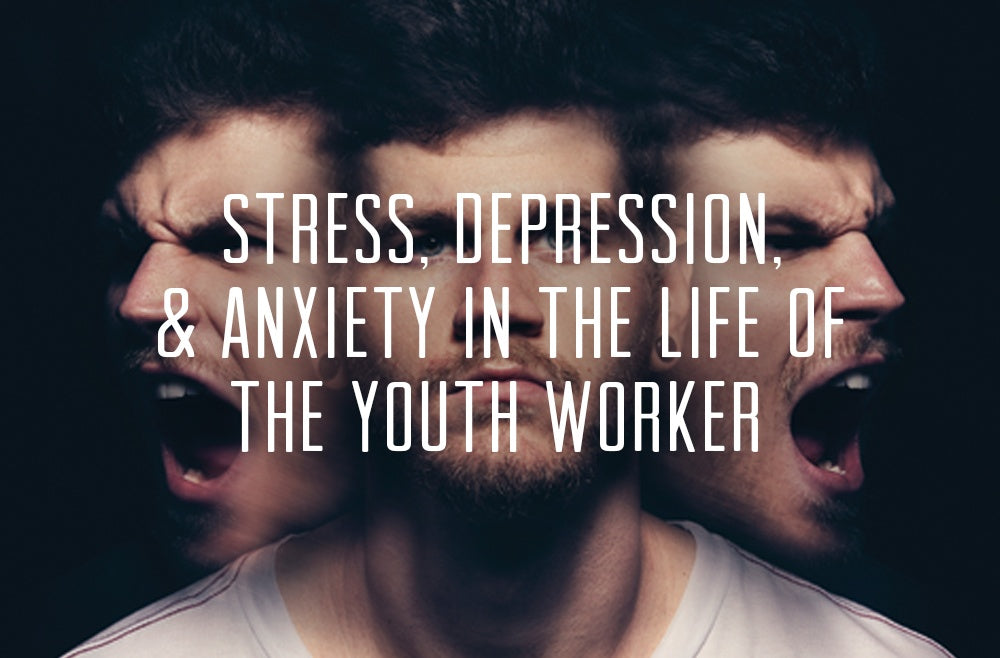
Stress, Depression, and Anxiety In The Life Of The Youth Worker
Experts say the most stressful work environment is one in which the worker has low control over his/her situation (in other words, a lot of bosses to answer to), low pay, and high expectations. Welcome to the modern day world of student ministry! The highly stressful atmosphere surrounding some youth ministers can lead to a variety of physical and emotional problems, including anxiety and depression.
I've been a youth pastor for over three decades and I've had battles with both anxiety and depression. This is my story, one I hope will help you find peace in your daily life and increase your tenure in student ministry.
I was at my first church almost four years when our second daughter was born. At the time our church was without a pastor. I was the only full-time minister on staff. I was also working on my Masters.
Needless to say, there was a lot going on in my life.
One night I was sitting in class when suddenly it just felt like someone opened a big hole in the floor and I was falling through. I was in the early stages of a bout with depression. Fast-forward a year-and-a-half. It was the month of December and our youngest daughter was about to have some sinus surgery at a hospital two hours away. If the stress of that situation were not bad enough, the night before the surgery we were staying at a hotel when a tornado struck less than ten miles away. Between the anxiety of the tornado episode and the stress of watching my 18-month-old child being wheeled into an operating room, it was not long until I sunk into a very deep, depression which took about four months to start lifting but took a good year for a complete recovery.
The next seven years were depression free. But in the winter of 1993, I tackled a new enemy: anxiety. I had been called to another church in 1989 and late in 1992 both our pastor and music minister resigned. Once again, I was faced with being the only full-time staff member at a rather large church. Then to make matters worse, I decided to ask the pastor search committee if I could serve as interim pastor. Now there was a great plan!
About three months into this arrangement the pressure of what I was trying to do caught up with me. I started having panic attacks and developed some major symptoms of anxiety. Finally, I decided to seek some professional help. A fabulous Christian psychiatrist worked with me and helped me discover some things about myself and my line of work. His insights and medicinal intervention not only helped me recover but gave me some tremendous coping skills which I have relied on time and time again over the past sixteen years.
What I Learned . . .
My experience with depression and anxiety were linked to two things; a family history of the illness (genetics), and stress. I discovered that there was a history of both anxiety and depression in my family. I also learned about stress, which is the way the body responds to change. It doesn't matter if it's good change (like a better job) or bad change (like the loss of a loved one); the changes around us create stress reactions in the body. There were times in my life when the changes could not be avoided and there were times, like taking on the responsibility of leading a church for five months, I could have avoided some stress.
Here's what you can do to be more proactive in addressing depression and anxiety:
Be aware of change
The change in your life such as taking a new church, a change in pastor, the birth of children, financial commitments, finishing school, etc., will take their toll on your physical and emotional well-being. Realizing this is the first part of the battle.
Delay change if possible
If you know you are going to be going through a lot of stress or change, cut off any unnecessary change or increased responsibility (i.e., me asking for the interim pastor's gig)
Take A Test
Look on the internet for the Holmes-Rahe Life Stress Inventory to get an idea of the amount of change currently going on in your life. A score of over 300 is considered a slight danger zone.
Know Your History
Check into your family history and see if there is any history of anxiety or depression. If there is then you could be more vulnerable than most people.
Know The Signs
Knowing the signs of overstress is extremely important: fatigue, aches, and pains, anxiety or abnormal fears, problems sleeping, feeling overwhelmed, loss of enjoyment over things that used to make you happy, uncontrollable emotions. Equally, as important is knowing the warning signs of depression: feeling empty or sad, weight gain or loss, difficulty concentrating, sleeping too much or not enough, feeling guilty or worthless, thoughts of suicide.
Get Help
Knowing when to get professional help is a must. Maybe a little time-off can help sometimes but there are situations where it is time to consult a doctor or therapist. There is no doubt that if I had sought the proper help at an earlier age I might not have had to experience so many episodes of depression and anxiety in my life.
I wish I could say I am completely healed but that is not the case. I still deal with anxiety at various times and every so often I even feel a tad of depression but both are manageable and do not keep me from working in the wonderful calling of youth ministry.




Leave a comment